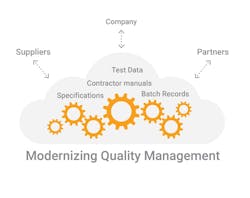For the life sciences industry, adding partners to the mix has introduced growing complexity across global supply chains. Over the past several decades, key business and manufacturing processes have moved to contract partner organizations. This trend is expected to continue, as the pharmaceutical contract manufacturing market grows annually at a rate of 6 percent by 2023.
Many organizations outsource key functions and are limited by legacy systems. It is difficult to provide partners access to critical information, procedures, documents and other content.
As a result, the life sciences industry is moving toward digitalization and fully integrated, end-to-end processes. In fact, one-third are digitalizing their supply chains and realizing annual efficiency gains of 4.1 percent and revenue boosts of 2.6 percent each year.
The cloud is helping both large and emerging life sciences companies modernize operations. Companies are reducing risk in product supply and seamlessly incorporating contract partners for improved collaboration. Specifically, with a digitalized, data-driven supply chain in the cloud, companies of any size can make better, smarter decisions by turning data into actionable insights.
Two companies, Gilead Sciences and Karyopharm Therapeutics, wanted to provide greater transparency for internal and external stakeholders while improving technical operations. They have modernized product supply and accelerated time to market by leveraging the cloud in three main areas: contractor manuals and other partner content, technology transfer, and batch record review.
Gilead Optimizes Partner Operations
At Gilead Sciences, global quality teams need to manage a variety of partner content and streamline technology transfer. With a signifcant amount of manufacturing outsourced worldwide, Gilead requires modern processes and technology that seamlessly span the company and its partners.
To match its growth in outsourcing, Gilead leveraged a cloud-based quality solution to oversee a larger number of stakeholders across internal functions and external vendors. Their challenge was harmonizing business processes for better partner collaboration and training globally dispersed teams.
Gilead operationalized partner onboarding to ensure a smooth transition to the new solution. Gilead reports that partners are more productive, with two times more user growth and four times more documents in the system.
Now, Gilead can better manage the interchange of critical manufacturing content, data, procedures, and other information with contract partners by connecting them to internal procedures. An effective, modern supply chain enables more timely release of new products and efficient partner management.
Distribute and Manage Contractor Manuals Faster
Contractor manuals (also known as supplier manuals) are critical for partner collaboration at Gilead. A contractor manual provides a set of documents such as approved specifications, master batch records, and test methods that a partner uses to make the product according to company and regulatory requirements.
Gilead sends new or updated documents to a partner, and knows immediately when the partner receives, views, or implements the request, such as incorporating new specifications. As a result, Gilead has greater visibility into partner operations. Creating, revising, and distributing a document to third parties is now an easy and secure process.
For greater control over externalized processes, Gilead applies granular levels of security according to what each contract partner can see and do. As the number of partners or contractor manuals increases, Gilead’s solution can easily scale. With a single source of truth into partner content, Gilead ensures contract partners use the most up-to-date procedures.
Each partner’s engagement is measured by tracking information such as response times. Operational and performance metrics help Gilead gain insight into partner performance to make data-driven decisions.
Secure and Efficient Tech Transfer
Technology transfer is a complex process, involving a large body of knowledge and many different disciplines. Common challenges include missing critical content or providing methods that lack detail. These gaps can hinder a new site from reproducing company results.
With a consistent, controlled process, Gilead can now easily find and share all relevant information and ensure third parties always have up-to-date content. Not only can partners access the right version, but the same document can be securely shared across multiple partners — without them being aware of each other.
Looking ahead, Gilead wants to make technology transfer more collaborative, allowing contract organizations to provide feedback on procedures and protocols. Questions from a new site or partner will be tracked to make sure they are addressed. Increasing collaboration will help improve technology transfer in the future.
Expedite Batch Record Review
Maintaining oversight of CMO-generated information can be a challenge. Gilead has modernized their batch and lot disposition process with CMOs to provide greater transparency for all parties.
For example, once a contract partner uploads analytical test results or a completed batch record, Gilead’s quality team gets notified to review the data and can track questions and discrepancies. The partner then addresses the discrepancies or questions, and if necessary, re-uploads the record for acceptance. This process demonstrates control and reduce risk by tracking and addressing all items that could escalate into product deviations.
By tracking the data associated with the batch review process, Gilead can measure the level of engagement for each partner. The quality team tracks the number of discrepancies for each partner and how long they took to respond, using the data to generate insight on partner performance. With the improved process, Gilead has decreased cycle times by 25-30 percent from data review to batch authorization.
Karyopharm Drives Better Manufacturing Externalization
Karyopharm, an emerging oncology pharmaceutical company, outsources all manufacturing to contract manufacturing organizations. The cloud facilitates many externalized processes across the organization, including batch and lot disposition, and supports greater third-party collaboration and regulatory compliance.
Streamline Collaboration for Faster Development
Intensifying regulatory requirements for partner oversight has led to an increase in information exchange. To maintain control and oversight, large quantities of documentation and detailed information was shared by Karyopharm and its CMOs. With content exchanged across five different channels, teams often inadvertently created multiple copies of the same document or created versioning confusion — resulting in process inefficiency.
“We now have a single source of truth into content,” Maria Conklin, quality control associate director at Karyopharm, says. “Users can find the most recent version of a document ten times faster.”
Teams now locate a document in less than two minutes instead of at least 20 minutes previously.
Companies must take full responsibility for the work being done at CMO facilities and with a cloud solution, both parties can stay aligned on projects and have information accessible for regulatory and project needs.
“Collaboration and access among global stakeholders are critical to compliance and in driving operational alignment,” Conklin says. “We’ve accelerated cycle times by up to 30 percent.”
Moving to the cloud has enabled Karyopharm to not only work better with partners, but also drive more efficient regulatory filings. All documents are easily located and linked directly to submissions, so Karyopharm can find information faster.
Demonstrate Compliance With a Detailed Audit Trail
To stay inspection-ready, the cloud gives Karyopharm a comprehensive audit trail of who sent, received, or last accessed each procedure, including when a specific record supporting a product release was approved. Karyopharm can authorize what partners can see and do in the system, achieving a clear chain-of-custody.
Data integrity is also critical for regulatory compliance. Legacy systems are often not accessible by partners and other communication tools are used to close the gap, making it difficult to track information or create a single audit trail. With a central, cloud-based location for processes such as batch and lot disposition, Karyopharm can quickly demonstrate the data integrity of partner information.
“We can seamlessly incorporate manufacturing partners into quality processes, while also linking processes to relevant documentation for improved compliance,” Conklin says. “For instance, if we investigate a nonconformance, we can link the testing reports to the change control document and close out the investigation. We have a complete package to demonstrate to regulatory authorities that nothing was skipped and that the situation was resolved. And we can accomplish all of this efficiently.”
Karyopharm has access to critical manufacturing information, such as which individuals reviewed and accepted content to support a batch release. A detailed audit trail is readily available for audits or regulatory inquiries, giving Karyopharm complete control over its externalized operations.
Making the Move to the Cloud
It’s crucial for life sciences companies to establish efficient, effective procedures to collaborate with third parties. As more organizations externalize their manufacturing processes, cloud technology is poised to have a long-term impact on product supply digitalization.
The immediate benefits of a modern supply chain include streamlined collaboration between stakeholders, increased compliance, and greater visibility into partner processes. With a cloud-based solution, companies can turn data and metrics into useful insights.
Looking forward, by connecting product development, commercial manufacturing, and distribution networks in one digitalized system, cloud technology can provide end-to-end transparency in quality, and transform outsourcing.
[javascriptSnippet]


